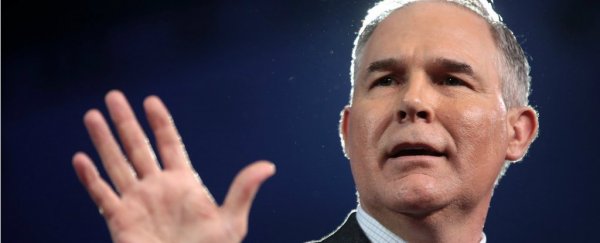This week, the Environmental Protection Agency (EPA) held a summit on a group of toxic chemicals, called polyfluoroalkyl and perfluoroalkyl substances (PFASs), which are currently at high levels in the drinking water of 33 states.
It was a rich opportunity to educate the public on an important health crisis, and yet, journalists were banned from the event.
The EPA's National Leadership Summit on PFAS was focused on whether and how the government should regulate dangerous chemicals that have been linked to adverse health outcomes, like certain cancers and immune disorders.
But when journalists from CNN and the Associated Press (AP) attempted to attend the summit, they were turned away.
"Oh, you're not allowed today," a uniformed security guard reportedly told a journalist from CNN.
"They ain't doing the CNN stuff. What's this, the press?"
A journalist from AP was forcibly ejected from the building by a security guard when she asked if she could speak to a public affairs person about the decision to not allow her in.
The only media allowed in the room were a handpicked, select group of journalists, but even they were only allowed to hear the first hour of the summit before being escorted out.
A spokesperson from the EPA said the decision was made based on space limitations at the event. Backlash from the press was immediate.
Sally Buzbee, the executive editor of the AP, called the whole debacle "a direct threat to the public's right to know about what his happening inside their government."
Politico, AP, E&E News and CNN all condemned the decision.
"The summit was focused on an important public health crisis that has affected drinking water supplies across the country, and chemicals that are present in the bloodstreams of nearly all Americans," said Politico editor Carrie Budoff Brown.
"We believe it is important that the news media have access to the entirety of this discussion to keep the public informed with fact-driven, accountability coverage of this important issue - we would much rather be writing about the agency's efforts to address this health problem than about reporters being excluded."
Congressional Democrats joined the media's cries of dissent.
It appears that @EPAScottPruitt’s multi-million dollar security detail is being used to “protect” him from the most significant threat to his @EPA: objective reporting by a free press. https://t.co/F1PnceqhVM
— Senator Tom Carper (@SenatorCarper) May 22, 2018
Democratic Senator Tom Udall joined Carper's criticism, calling the whole thing "intimidation of journalists."
In response, the White House said it would "look into" the EPA's handling of the event.
After such widespread criticism on the very first day of the summit, the EPA agreed to allow journalists into the event the next day. But on Wednesday, the agency reversed its decision once again.
A spokesperson from the EPA said they barred reporters because the event did not fall under a federal law requiring public access.
"The National Leadership Summit on PFAS scheduled is not a federal advisory committee event," said EPA spokesperson Jahan Wilcox.
"The purpose of this event is for EPA's state, tribal, and federal government partners and national organizations to share a range of individual perspectives on the Agency's actions to date and path forward on PFOA/PFAS. The Agency looks forward to hearing from all stakeholders on these crucial issues."
The press and Congressional Democrats weren't buying it.
I can’t believe I have to say this two days in a row, but @EPA works for the American people. Unfortunately, it’s clear that this EPA is more concerned with protecting the EPA chemical summit from the public than it is with protecting the public from harmful chemicals. https://t.co/zt38ORIi3n
— Senator Tom Carper (@SenatorCarper) May 23, 2018
The Society of Environmental Journalists poked holes in the agency's hollow excuse that there was not enough room for journalists at the summit.
"This meeting, organized well in advance to gather input on a critical public health policy initiative, as a matter of course should have admitted news reporters in order to inform the public about what occurred," the letter reads.
"But as recently as a couple weeks ago, your staff was informing reporters that there would be no room for the press at this invitation-only event, because there was not enough space in the room selected for it."
Democrats on the House Energy and Commerce Committee made a funny albeit depressing meme to illustrate their frustrations with the current state of the EPA.
Looks like @EPAScottPruitt got distracted from the EPA's mission again. #BootPruitt pic.twitter.com/dzyNNukps7
— Energy & Commerce Democrats (@EnergyCommerce) May 22, 2018
"Americans count on the Environmental Protection Agency every time they turn on the tap," Pruitt wrote in a press release for the event.
Without journalists at the event, the American public cannot count on the EPA to be honest and transparent about its approach to clean and safe water.
Science AF is ScienceAlert's new editorial section where we explore society's most complex problems using science, sanity and humor.
